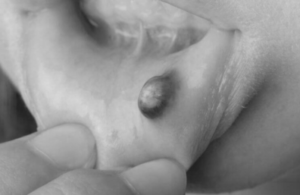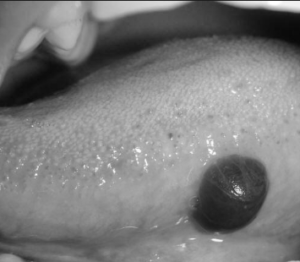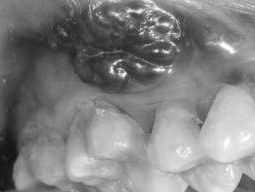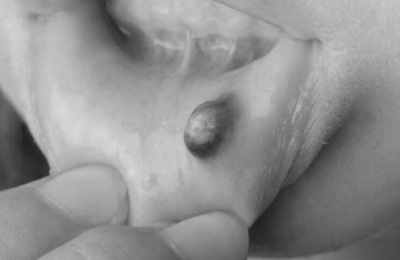Blood blister in mouth and cheek can be quite painful and cause you discomfort. Having blister filled with blood in the mouth can be irritating especially if the blisters are random. What does a blister filled with blood in the mouth mean? Is it a sign of cancer or a serious underlying medical condition? Find more as we explore on the causes and how you can treat blood blister inside your mouth.
Blood blisters inside the mouth are quite different from the normal blisters. The blisters contain more other fluids other than blood. There are number of reason behind the occurrence of blisters in your mouth. A mere trauma can cause blood blisters inside the mouth. Similarly, a more complicated health condition such as oral cancer can be depicted by the onset of blisters inside your mouth.
What is a blood blister?
A blood blister happens in most cases when blood vessels usually present beneath the skin layer tear or rupture. They tend to take the appearance of pimple with blood and other fluid trapped inside. They can be painful especially when infected and cause you pain while eating and chewing of food.
If you suffer from this condition, you may find it hard to brush your teeth and movement of the oral cavity becomes somehow limited due to the pain. In the post, we will discuss in detail the cause of blood blister in the mouth and how you can treat them effectively.
Blood blisters in mouth pictures
How does a blood blister in mouth look like? In the post we have pictures of blood blisters inside the mouth that give insightful illustration to better your understanding. We have also added more photos and images that can help you identify well with your symptoms.
In the post, we have a video that can help you to get the meaningful information on how you can get rid or remove a recurring blood blister in your mouth.


What causes blood blisters in mouth and Cheek?
What causes blood blisters in mouth? There are a number of causes for formation of blood blister inside your mouth. Here are some of the causes and discussion on bumps filled with blood in the mouth.
1. Oral ulcers
Ulcers in mouth and cheek can be the reason you are having blood blisters inside your mouth. Oral ulcers occur as a result of excessive invasion of microorganism within the oral cavity. If you have skin infection in the mouth which are at times caused by side effects of medication, blood blisters are likely to appear in the mouth. Ulcers in the mouth can be broadly categorized into types: canker sores and cold sores.
Most ulcers are mild and are caused by physical trauma such as biting the inside of the mouth and sometimes cheek while chewing gum or eating food. It actually takes less than a week to heal a blister in the mouth caused by ulcers. However, this can happen if the blister is not infected or not an indication of any serious health problem.
2. Allergies
Did you know that blood blisters in mouth can be due to allergies? If you are allergic to certain foods or drinks, it could be the reason you have blood blister in mouth. If you consume acidic or food rich in citrus you are likely to get blood blisters in your mouth.
Additionally, a small quantity of prescribed can trigger allergic reactions which in the long run can stimulate the formation of blisters in your mouth.
3. Blood blister in mouth cancer
Is blood blister in mouth a sign of cancer? If you notice blood blister inside mouth, you should see a doctor for evaluation and assessment to check whether the blister are early indication of mouth cancer. Cancer of the mouth usually starts in the cells lining of the mouth. The most affected parts of the oral cavity include the lips, tongue and the floor of the mouth.

Other areas that you are likely to get cancer in the oral cavity include: the gums, cheeks, tonsils, salivary glands and the palates. Symptoms of mouth cancer include
- a clear mass or lump in the mouth
- ulcers that won’t heal
- a persistent blood blister in the mouth
Mouth cancer is likely to affect people with 45 years and more, with men twice as likely to get affected by this type of cancer. Smoking and heavy consumption of alcohol is likely to increase the risk of mouth cancer. Early detection of mouth cancer can be treated, but most people do not consult their doctors until the disease gets to a critical stage.
4. Angina Bullosa Haemorrhagica
Blood blisters inside your mouth can be caused by Angina Bullosa Haemorrhagica (ABH): a condition characterized by sudden and unprovoked appearance of blood filled blisters over the oral mucosa including the mouth and the soft palate in middle age individuals without gender isolation.
ABH is considered a benign condition that is characterized by abrupt appearance of blood filled blisters in the mouth without an identifiable cause. It can spread on the lateral border of the tongue and soft palate. ABH is triggered by trauma such as eating hot foods, dental procedure which rapid onset of blistering that forms ulcers in few minutes in the mouth and other oral sites.
5. Vitamin Deficiency
Are you having blood blisters in your mouth? Blistering in the oral cavity can be a clear indication of inadequate or lack of certain vitamins in your body. Acute vitamin deficiency can lead to blistering, for instance lack of Vitamin B12 and Vitamin C are the primary cause of oral ulcers that can increase the risk of having blisters inside your mouth and the cheek.
Eat food rich in Vitamin C and B12, these foods include: fresh vegetables, guava, broccoli berries, milk, eggs, poultry and meat. If you supplement your diet with Vitamin C and B12, you not only make your immune system but also reduces the risks of blistering and oral ulcers.
6. Blood blister in mouth HIV, STD and Herpes
Is blood blistering in mouth a sign of Herpes, STD or HIV infection? Blood blister in the mouth can be an indication of mouth infection including Herpes simplex. Recurring or blisters that keep on coming back are associated with herpes simplex. If you have small, painful fluid-filled blisters on the mouth, lips and other areas such as the eyes and or genitals, then they are likely cause by viral infection from herpes.
Herpes is a contagious infection and can spread by direct contact with someone with sores or affected through oral sex. The infection cannot be eradicated by drugs but your doctor will recommend the use of Antiviral drugs that helps to relieve the symptoms.
Blistering in the mouth and cheek can be a sign of HIV infection. Patients with HIV infection have a weakened immune system such that any mild infection in the mouth such as cold sores or fever can cause blistering in the mouth and cheek. Sometimes pain or bleeding in the mouth can be a sign of infection. Other signs of HIV infection other than the mouth include: dry mouth, oral thrush, gum disease and or oral warts.
Mouth sores and blisters can be caused by STD which appear as blisters and or ulcers on the floor of the mouth and cheek. If the ulcerations is severe, bleeding may occur. Other than the cold sores or herpes simplex, syphilis is among the sexually transmitted disease that present its symptoms as sores and blistering in the mouth and lips.
7. Low platelet count
Blistering in mouth and cheek can be caused by a less serious condition such as low level of blood count in the bloodstream. When the platelets count in your body is low, your blood clotting mechanism becomes less efficient. In such a case, more blood flows into the mucous membrane and stay closer beneath the skin surface.
A minor injury or trauma can easily lead to development of blood blisters in the mouth and cheek.
8. Alcohol abuse and smoking tobacco
Alcohol abuse and excessive smoking of tobacco can lead to blood blisters inside the mouth and cheek. In many cases, blood blisters in mouth from smoking tobacco and excessive intake of alcohol cause ulceration of the oral cavity including the lips.
Smoking can cause allergic reactions due to the chemicals or poisonous components in the tobacco. This has an effect of causing blistering in mouth and cheek. Treatment of blood blisters inside the floor of the mouth involves quitting smoking and avoid abuse of alcohol. This reduces the severity of ulcer formation and blistering in the mouth and cheek.
9. Blood blister in mouth diabetes
Can diabetes cause blood blisters in mouth? Diabetes can affect every part of your body including the skin. People with diabetes are prone to get several kind of bacterial infection including boils, folliculitis, carbuncles and styes. People with diabetes are likely to develop diabetic dermopathy.
This condition causes abrupt changes in the small blood vessels and changes in skin. Another condition is diabetic blister that rarely turns out form blisters. It can occur on the back of the fingers, toes, hands, feet and sometimes the legs and forearms. People with diabetic blisters experience sore like burns blisters.
The blisters can be large but are less painful and have no redness unless they are infected. They do not need treatment; they heal by themselves in about three weeks without scarring.
Allergic reactions can occur in response to medications such as insulin or diabetic pills, this can cause blistering in the mouth.
10. Blood blisters in mouth celiac disease
Another possible cause of blistering is having a celiac disease or gluten intolerance. Some people may have allergic reaction when they eat food rich in gluten, this has an effect of blistering on the tongue, cheek, soft palate, inside of lips and the floor of the mouth.
Other symptoms of celiac disease include: dry patches on the skin, weight gain or loss, hair loss, nerve aches, joint pains, muscle aches, skin rashes, dry eyes and mouth, itchy eyes among others.
This condition is treated with steroids to reduce the painful inflammation that might be experienced in the gut.
Blood blister in mouth cheek pregnancy
Is having blood blister in the mouth and cheek during pregnancy normal? Early sign of pregnancy of pregnancy can be linked to blood blister in mouth and cheek. This can be associated to hormonal changes and low platelets counts.
It is normal to have blood blisters in your mouth and cheek during pregnancy. Stress levels can also be the cause of blistering in mouth. If you are pregnant, observe closely your diet especially iron and vitamins that can help raise the volume of blood.
Random Blood blister in mouth child
Is it normal for an infant to have a blood blister? Blood blister in cheek and mouth of a toddler is normal unless it is caused by an infection or underlying medical condition such as moth cancer. It is actually normal to see blisters in mouth and cheek of a toddler as soon as teething occur. The blisters can appear as small random bruise on the baby’s gum, lip and mouth. This is called a teething blisters or sometime referred to as eruption cyst.
You shouldn’t try to pop these blisters, instead let your dentist know if your child has blisters. Popping a blister in the mouth of an infant risks the chances of infection and can be very painful for the child to bear.
Blood blister in mouth not going away – recurring blood blister in mouth
Do you have blood blisters in mouth that is not going away? A recurring blood blister inside your mouth and cheek is an indication of infection such as oral herpes. Recurrent blood blisters could signal problems that requires medical treatment.
Herpes simplex is a common virus that appear on the soft palate and the roof of the mouth. They can start out as small blisters that form one big, painful sores on the roof of the mouth. Treatment involves taking herpes medication such as acyclovir; it helps reduce the reproduction of the virus that causes blood blisters inside your mouth and cheek.
Sometimes herpes couldn’t be the trouble, you may be infected with some other virus. If you have an adverse reaction to medications, this can lead to blood blister in mouth that is not going away.
Rare genetic disorders like epidermolysis bullosa, pemphigus and pemphagoid can be the reason you’re having recurrent blood blisters in the mouth.
Painless blood blister in mouth
Do you get painless blisters on your inner cheeks of your mouth? Blistering in mouth and cheek can sometimes be painless, you only notice when you visit a dentist. Such sudden occurrence of visible bumps filled with blood in the mouth without identifiable cause can be associated with Angina Bullosa Haemorrhagica (ABH): a benign condition that cause blistering in the oral mucosa.
Big Blood blister in mouth after tooth extraction
It is normal to have a blood like blister in the mouth after tooth removal. When you go for tooth extraction, the extraction socket forms a blood clot which appears like a blood blister in your mouth. This shouldn’t worry you much but rather it is a good sign of healing process where the tooth was initially removed.
You need to do a follow up treatment as prescribed by your dentist to reduce the risk of infection in the socket where the tooth was removed. Infection can lead to perforation of bones and appear below the gums as blisters. It might lead to pain if there is a repeated infection, pus will accumulate leading to a condition known as dental Abscess.
Blood blister in mouth treatment
Oral blisters are mild and will eventually disappear with time. It takes less than two weeks to heal naturally blisters in the mouth and cheek. If the blisters are recurrent, visit a doctor for prescription and diagnosis.
Take medications
In most cases, antiviral medicines are used to treat blood blisters due to infection. In circumstances where there is pain, painkillers are used to reduce the pain and speed up the healing process.
Your doctor may recommend medicated mouth washes, ulcers gel and toothpastes to help treat the blister in your mouth.
Eat a diet rich in Vitamin C and B12
Blisters that occurs as a results of vitamin deficiency especially C and B12, can be treated by supplementing your diet with the missing vitamins. Eating foods rich in the Vitamins mentioned can reduce the chances of getting blood blisters in the mouth and cheek. You can as well avoid spicy, acidic foods that tend to damage the inner lining of the mouth including the soft palate.
Treat your allergies.
If you are allergic to foods or drinks that tend to cause blistering in the mouth, you should visit your healthcare provider to treat allergies.
Home Remedies to Treat Blood Blisters in Mouth
If the cause of blisters inside your mouth is mild, you may treat with home remedies. However, it is important to consult your healthcare provider to assess the nature of the blister. Here are some of the simple home remedies to treat blisters.
- Apply a cold compress on the blisters at least twice daily to minimize pain and reduce any swelling.
- Sea salt can help you treat blood blisters in your mouth. Add sea salt to warm water and use this as a mouthwash to gargle the mouth at least 2 times daily. This saline solution helps to sterilize the blisters and allows the blisters to heal faster.
- Do not try to squeeze the blisters, you risk getting bacterial or fungi infection which can aggravate the problem. Blisters will heal on their own naturally.
- Aloe Vera juice can help heal the blisters effectively and fast. Make aloe Vera juice from fresh cut aloe plant. Squeeze the gel, you may apply on the blister or gargle the mouth. Aloe Vera is medicinal in nature and helps to soothe the blisters.
Sources and references:
- http://www.ncbi.nlm.nih.gov/pmc/articles/PMC3778802/
- http://www.msdmanuals.com/home/infections/viral-infections/herpes-simplex-virus-infections
- http://www.babycenter.com.au/a6574/developmental-milestones-teething
- http://rdoc.org.uk/eve/forums/a/tpc/f/46510549/m/42510159



